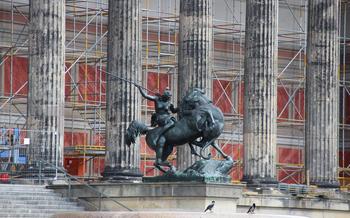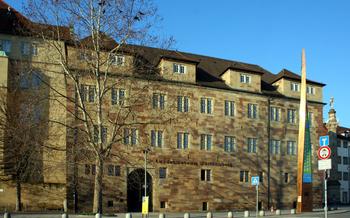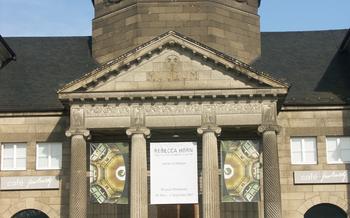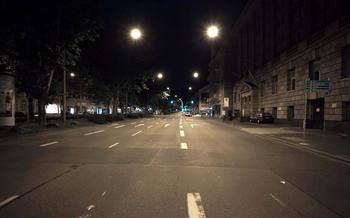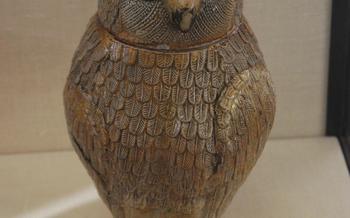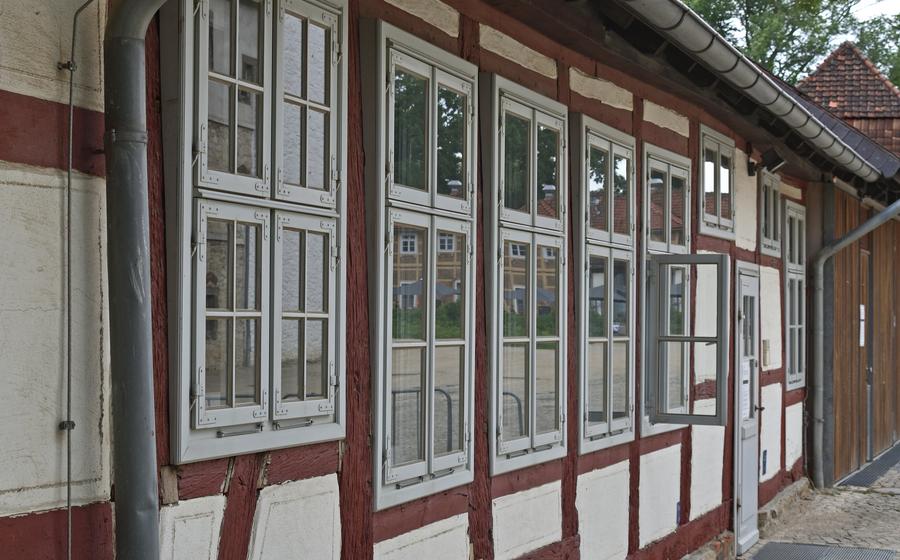
Wolfsburg Doll Museum
- Wolfsburg Doll Museum
- Exhibits
- History of Dolls
- Doll Making Demonstrations
- Hands-On Activities
- Special Events
- Museum Shop
- Accessibility
- Hours of Operation
- Admission Fees
- Location
- Parking
- Food and Drink
- Accommodations
- Insider Tip
Wolfsburg Doll Museum
The Wolfsburg Doll Museum, located in the heart of Wolfsburg, Germany, is a treasure trove of dolls from around the world. Founded in 1985, the museum houses an impressive collection of over 10,000 dolls, ranging from antique to contemporary pieces. Visitors can explore the history of dolls, learn about the different techniques used in doll making, and even create their own dolls in the museum's workshop.
The museum's collection highlights include a rare 18th-century wooden doll, a life-size porcelain doll from the 19th century, and a collection of dolls from the famous German doll maker Käthe Kruse. The museum also features a variety of special events throughout the year, such as doll shows, auctions, and doll-themed parties.
Guided tours of the museum are available in English and German, and audio guides are available in multiple languages. The museum is wheelchair accessible and strollers are welcome. The museum's shop offers a wide range of dolls, doll clothes, and accessories, as well as unique gifts for doll collectors.
Exhibits
The Wolfsburg Doll Museum is home to a vast and diverse collection of dolls from around the world. Visitors can see dolls from every era of history, from ancient Egyptian dolls to modern Barbie dolls. The museum also has a collection of historical dolls, including dolls that were once owned by royalty and celebrities. In addition to traditional dolls, the museum also has a collection of contemporary dolls, including art dolls and designer dolls. These dolls are often one-of-a-kind works of art.
The museum's collection of dollhouses is also impressive. The dollhouses range in size from small room boxes to large, multi-room dollhouses. Some of the dollhouses are replicas of real houses, while others are more whimsical creations. The dollhouses are all furnished with intricate detail, and they provide a glimpse into the lives of people from different cultures and time periods.
History of Dolls
Dolls have played a significant role in human culture for centuries. They have served various purposes, from toys and playthings to religious and ceremonial objects. In ancient Egypt, dolls were used as funerary offerings and were believed to accompany the deceased into the afterlife. In ancient Greece and Rome, dolls were used as playthings for children and were often made of wood, clay, or wax. During the Middle Ages, dolls were primarily crafted for religious purposes and were used in nativity scenes and other religious displays.
The Renaissance period saw a surge in the popularity of dolls, particularly fashion dolls, which were used by wealthy women to display the latest fashions. In the 19th century, the invention of new materials, such as porcelain and bisque, led to the creation of more realistic and detailed dolls. These dolls became increasingly popular as collectibles, and their production became a major industry. Today, dolls are still widely collected and enjoyed by people of all ages. They continue to be used for play, education, and decoration, and their rich history reflects the diverse cultures and traditions of the world.
Doll Making Demonstrations
Have you ever wondered how dolls are made? At the Wolfsburg Doll Museum, you can watch skilled artisans create dolls right before your eyes. These demonstrations are a fascinating way to learn about the different techniques used in doll making, such as sculpting, painting, and assembling.
The artisans at the museum are experts in their craft, and they are always happy to answer questions about the process. You can ask them about the materials they use, the techniques they employ, and the inspiration behind their designs.
After watching a demonstration, you will have a new appreciation for the artistry and craftsmanship that goes into making dolls. You may even be inspired to try your hand at doll making yourself.
The museum also offers doll making workshops, where you can learn how to make your own doll. These workshops are a great way to learn new skills and create a unique keepsake.
Hands-On Activities
The Wolfsburg Doll Museum offers a variety of hands-on activities for visitors of all ages. These activities are a great way to learn more about dolls, how they are made, and how to care for them.
Create Your Own Doll
One of the most popular hands-on activities at the museum is the opportunity to create your own doll. Visitors can choose from a variety of materials and supplies to create a one-of-a-kind doll that they can take home. The museum staff is available to help visitors with the process, and there are also a number of helpful tutorials available online.
Dress Up Dolls in Different Outfits
Another popular activity is the chance to dress up dolls in different outfits. The museum has a large collection of doll clothes that visitors can use to create their own unique looks. This activity is a great way to learn about different cultures and traditions, as well as the history of fashion.
Play with Dolls in the Museum's Playroom
The museum also has a playroom where visitors can play with dolls. The playroom is equipped with a variety of toys and games, as well as a number of dolls that visitors can borrow. This activity is a great way for children to learn through play and to develop their imaginations.
Attend Doll-Making Workshops
The museum also offers a number of doll-making workshops throughout the year. These workshops are a great way to learn more about the art of doll making and to create your own unique doll. The workshops are led by experienced doll makers, and all of the necessary materials are provided.
Special Events
The Wolfsburg Doll Museum hosts a variety of special events throughout the year. These events are a great way to learn more about dolls, meet other doll enthusiasts, and find unique gifts.
Some of the most popular special events include:
- Doll shows: These shows feature dolls from around the world, including antique dolls, modern dolls, and artist dolls.
- Doll auctions: These auctions offer a chance to purchase one-of-a-kind dolls and other doll-related items.
- Doll-themed parties: These parties are a great way to celebrate your love of dolls with other enthusiasts.
- Educational programs: These programs offer a variety of learning opportunities, such as doll making workshops, doll history lectures, and doll identification classes.
Museum Shop
The Wolfsburg Doll Museum's shop is a treasure trove for doll collectors and enthusiasts. Here, you can find a wide variety of dolls, doll clothes, and doll accessories from all over the world. Whether you're looking for a one-of-a-kind doll to add to your collection or a unique gift for a doll lover, you're sure to find it here.
The shop also offers a selection of books, magazines, and other publications about dolls. This is a great place to learn more about the history of dolls, the different types of dolls that are made, and the art of doll making.
By purchasing items from the museum shop, you can support the museum and its mission to preserve and promote the art of doll making. The shop's proceeds help to fund the museum's exhibits, educational programs, and special events.
Accessibility
The Wolfsburg Doll Museum is committed to providing an accessible and enjoyable experience for all visitors. The museum is wheelchair accessible, with ramps and elevators providing access to all levels of the building. Strollers are also welcome, and there is ample space for them to move around the exhibits.
Guided tours are available in English and German, and audio guides are available in multiple languages, including English, German, French, Spanish, and Russian. The audio guides provide a detailed description of the exhibits, making it easy for visitors to learn about the history of dolls and the different cultures that they represent.
Hours of Operation
The Wolfsburg Doll Museum is open to visitors from Tuesday to Sunday, from 10 am to 6 pm. Please note that the museum is closed on Mondays and major holidays. If you are planning to visit the museum, it is advisable to check the museum's website or call ahead to confirm the hours of operation, as they may be subject to change.
Admission Fees
The Wolfsburg Doll Museum offers a tiered admission fee structure that caters to visitors of all ages and family sizes. Adults can purchase a ticket for €5, while children between the ages of 6 and 14 can enter for a reduced fee of €Admission is free of charge for children under the age of Families can take advantage of a special family ticket, which admits two adults and two children for a discounted price of €This option provides a cost-effective way for families to enjoy the museum's offerings together.
Location
The Wolfsburg Doll Museum is situated in the city center of Wolfsburg, Germany, and it is a pleasant stroll away from the Wolfsburg Hauptbahnhof (main train station). The Wolfsburg Doll Museum is conveniently located with a bus stop right outside its entrance. Whether you prefer the comfort of public transportation or the freedom of driving yourself, the museum is effortlessly accessible. For those arriving by car, there is a paid parking lot close to the museum, and street parking is also available in the surrounding area.
Parking
There is a paid parking lot adjacent to the museum, which is a convenient option for those who are driving. Street parking is also available in the surrounding area, but it is important to note that it is often limited and may require some searching. If you are planning to visit the museum for an extended period of time, it may be more economical to park in the museum's parking lot. It is recommended to arrive early to secure a parking spot, especially during peak tourist season or on weekends.
Food and Drink
If you need a break from exploring the fascinating world of dolls, the museum has a cozy café that serves light snacks and beverages. You can enjoy a cup of coffee or tea, accompanied by a delicious pastry or sandwich, while taking a moment to reflect on the exhibits you have seen. Outside the museum, you will also find a variety of restaurants within walking distance, catering to different tastes and budgets. Whether you are in the mood for traditional German cuisine, international flavors, or a quick bite, you can easily find something to satisfy your cravings.
Accommodations
Wolfsburg offers a variety of accommodation options to suit all budgets and preferences. From budget-friendly hostels to luxurious hotels, there's something to cater to every traveler. For a truly immersive experience, consider staying at one of the many traditional German guesthouses, where you can enjoy local hospitality and cuisine.
Several hotels are within walking distance of the museum, making it easy to explore the city and its attractions. If you prefer to be closer to nature, there are also several campsites and holiday parks in the surrounding area.
To make the most of your stay, consider booking your accommodation in advance, especially if you're visiting during peak season. Many hotels offer special deals and discounts if you book online or through their website.
Here are a few recommended hotels in Wolfsburg:
- The Ritz-Carlton, Wolfsburg: A luxurious hotel with stunning views of the city and the surrounding countryside.
- The Steigenberger Hotel Wolfsburg: A modern hotel located in the heart of the city, just a short walk from the museum.
- The Mercure Hotel Wolfsburg: A budget-friendly option with comfortable rooms and a convenient location.
- The Jugendherberge Wolfsburg: A hostel with a friendly atmosphere and a variety of room options, including private rooms and dorms.
Insider Tip
Visit the museum on a weekday to avoid crowds
The Wolfsburg Doll Museum is a popular destination for tourists and locals alike, so it can get quite crowded on weekends and during school holidays. If you want to avoid the crowds, try to visit the museum on a weekday.
Take advantage of the free guided tours and audio guides
The Wolfsburg Doll Museum offers free guided tours in English and German, as well as audio guides in multiple languages. These tours are a great way to learn more about the museum's collection and the history of dolls.
Allow plenty of time to explore the museum's exhibits and participate in the hands-on activities
The Wolfsburg Doll Museum has a lot to offer visitors, so it's important to allow plenty of time to explore the exhibits and participate in the hands-on activities. You could easily spend several hours at the museum, so plan your visit accordingly.
